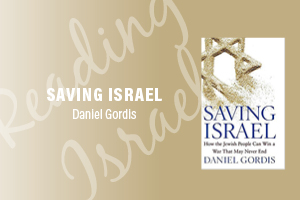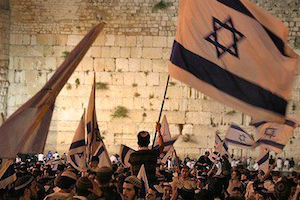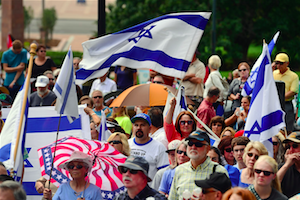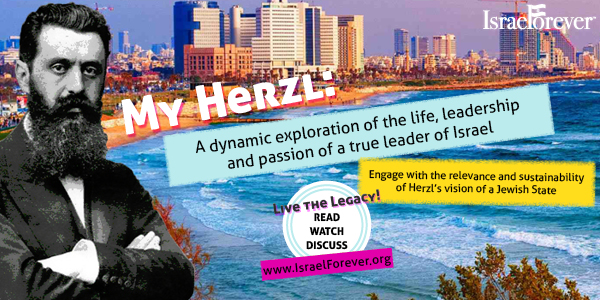My Herzl, My Judaism, My Generation
By Raya T.
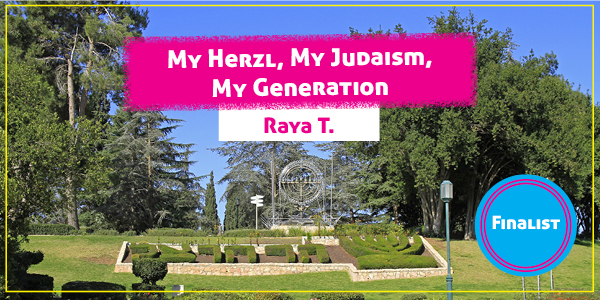
There’s a wonderful story told about the great Yiddish writer, Isaac Bashevis Singer, a Nobel prize laureate who was asked how he felt about winning the Nobel prize for writing in Yiddish, then considered a dying language. Singer cleverly responded, “there’s a long way between dying and dead.”
As it turns out, Singer was right, Yiddish is being revived worldwide. If Yiddish can be revitalized, we must have faith that some of the biggest challenges facing Jewish people in the 21st century can also be resolved.
Among the main issues that the Jewish people face is the imminent threat to Jewish youth in four areas:
- A shocking 60% of American youth from intermarried homes do not identify as Jews (intermarriage now comprises 70% of Jewish marriages!).
- Another alarming concern is that 50% of American Jewish youth under 35 would not view the destruction of Israel as a personal tragedy.
- A further related area requiring our urgent attention is the growing divide between Jews in the Diaspora and Israel, that may threaten the survival of the Jewish people.
- And finally, with each new generation, we see an alarming lack of Jewish literacy.
I hope to offer some possible solutions to these critical challenges.
There may be many images of Theodor Herzl in existence, but one that hasn’t been publicly viewed is the most treasured picture in my family collection. It is a picture taken in Munich at the wedding celebration of my late Bubby and Zayda, both Holocaust survivors. They are seated at their wedding surrounded by friends—who, like them, are Holocaust survivors. Immediately behind them, is a large picture of Herzl, positioned very prominently.
The picture was taken a month before the declaration of the state of Israel in 1948. The symbolism of the Herzl picture is not lost to those at the ‘chasenah,’ Yiddish for 'wedding.' To my grandparents and survivors, Herzl was a hero to our people. They understood the deep significance of a homeland for Jews. As Professor Irwin Cotler, so aptly said, “It’s not that the Holocaust gave rise to Israel, but had there been an Israel, there never would have been a Holocaust.”
After my Bubby Ruchala was liberated from Dachau in May of 1945, the very first thing she bought was a camera. While her family’s pictures had vanished forever like millions of others, through pictures she would rebuild her family’s life with the customs, traditions, and culture that had existed for thousands of years.
Similarly, I know what it’s like to be robbed of family heritage and a past—to have no pictures or documents that record history. I never knew my birth family and my identity remains a mystery. I was born in China, during the one child policy, where families were allowed to have only one child. As most families chose to keep their sons, millions of girls were killed or aborted in what’s been called a ‘gendercide.’ In an attempt to save me, my birth family released me to an orphanage. My fate was to be adopted as a baby into a Canadian Jewish family.
I understand deeply what it means to be a survivor of genocide, having the scars of two genocides in my history—two heritages to commemorate and also to celebrate.
I identify as Jewish and Chinese. I treasure both of these identities which have enriched my life. Exposed to both of my mother tongues, I adore my ‘mamalushens,’ Yiddish and Mandarin. I’ve grown up eating kugel, kreplach, and kneidlach, with chopsticks.
I know what happens when people are stripped of their rights. I have witnessed complicity where millions perished, as the world remained largely silent. As Elie Wiesel said, “We must take sides. Neutrality helps the oppressor, never the victim.”
Herzl remains a heroic example of defiance and resistance. Herzl was not defined exclusively by the anti-Semitism of his world, but how he, as a Jew, could counter it. In other words, he was not defined by what had been done to Jews. What became far more significant was what Jews had to do for themselves. In the spirit of Herzl, we must present not as victims of our times, but as activists. Instead of focusing on how anti-Semitism or the Palestinian conflict might be impacting us, we must also consider what we are in danger of doing to ourselves.
We face an urgent crisis among today’s young Jews. When asked if the destruction of Israel would be a personal tragedy, an astounding 50% of Jewish Americans under 35 said it would not.
How are we addressing this crisis of Jewish youth who are becoming more alienated and disengaged from their Jewish identities? We need to be reimagining Jewishness so it’s relevant to younger generations. We need to strike a balance between pluralism, inclusivity, and tradition.
At my shul (Congregation Habonim in Toronto), for instance, I am invited to give congregational sermons for the High Holidays, I sing the liturgy and read from the Torah, and contribute to our shul’s social justice events. As a recipient of The Bronfman Fellowship, I joined 50 Israelis and Americans to explore Jewish history and culture which further evolved my Jewish identity. At both Habonim and The Bronfman Fellowship, you’re accepted if you have a meaningful connection to being Jewish and want to sustain it. Other shuls and programs are moving in this direction, but not nearly enough of them and not nearly fast enough.
A shocking 60% of the kids from the many intermarriages don’t identify as Jewish. When kids from intermarriages don’t identify as Jewish, it’s likely because they’re excluded from the Jewish community and they have been deprived of Jewish literacy.
These kids are not leaving Judaism. They haven’t been exposed to it or studied it and it’s unfair to them. They don’t even know what they’re losing. It’s not that these kids have left Judaism, it’s that Judaism has left them.
And that leads to the obvious question. What does being Jewish even mean? Being Jewish is not necessarily about faith or belief in God. We Jews are a people and a nation, with our own languages and culture, including a system of belief and law rooted in universal justice. Being Jewish is characterized by argument, objection and opposition – all in the name of striving for justice. Jewish progress has always been fueled by tradition, criticism, and innovation. Judaism needs to evolve and be exciting or else it becomes irrelevant. Those who practice it should view it as a privilege, not a burden.
The staggering number of youth who are apathetic towards their Jewish identity must be addressed urgently. The time to reverse this trend is now.
We’ve done a great job of connecting to the past and honouring the Shoah and that’s meaningful. But if we don’t connect to the future, the future will disappear as well. Let’s take the past and make sure it ends up being transmitted to the future in a way young people can relate to.
Including the voices of youth in this year’s World Zionist Congress is an inspired step in the right direction. Moving forward, when you’re making your communal decisions, whatever they’re about, whatever direction you’re going in, whatever program, whatever initiative you’re involved in, the question should be: How is it going to connect to young people? Ask yourself, does this include and respond to young peoples’ needs? That’s what you need to do—otherwise, you’re going to lose us, the future of the Jewish people.
One of the most critical issues facing the Jewish people is the loss of our Jewish youth. 50% of kids don’t care if Israel is destroyed. Our first line of defence must be Jewish literacy. Apathy is the symptom, but illiteracy is the cause. We cannot expect Jewish youth to care about something they know virtually nothing about. The calls for Israel’s disappearance or non-importance, particularly among some of our own youth, must be resisted.
What is at stake in Israel is not just the Jewish state but the future of the Jewish people. The question becomes, can the Jews survive without a state of Israel? As we are besieged by anti-Semitism globally, both from the right and the left, and face our own inner weakness, dare we think that we are immune to another Shoah? The state of Israel is critical to our survival as a people. Israel may seem invincible but Jewish history has shown us how fragile our freedom has always been.
“Zionism has both united and divided the Jewish people in a way that no other movement ever has and that as we all have seen is uniquely true of the relationship between American Jews and Israel,” as author Daniel Gordis writes. I ask: what are some of the causes of the rift between Jews in Israel and the Diaspora, and how can the rift be healed? With respect to the Diaspora, I speak specifically about America, as it is home to the largest Jewish community.
Many Jews, particularly in the Diaspora, feel shame, humiliation and embarrassment because of the Israeli-Palestinian tensions. This rift is especially prominent among youth. But as Gordis suggests, “The real issue that divides the world’s two largest Jewish communities is not what Israel does but what Israel is. The essential issue is that at their cores, Israel and America are exceedingly different, founded with different purposes. They believe in and promote very different kinds of democracies with very different values.”
Having a history of anti-Semitism, persecution, and genocide, Israel was created to offer freedom and sanctuary to the Jewish people. Herzl intended for Israel to be a national home to the Jews. The American vision was to welcome people of all backgrounds.
The fundamental differences between America and Israel are hardly ever raised in discussions about the two communities. The failure to address these core differences camouflages some of the urgent issues confronting the two communities, elevating the tensions between them. Each of us must define what it means to be a Jew and their understanding of Israel’s purpose. However, to have these conversations, we need to enrich our Jewish literacy—an understanding of history and culture.
“The sad reality is that the wealthiest and most politically involved, culturally invested and secularly educated Diaspora community in the entire history of Jewish people is also, by far, the least Jewishly literate community ever created by Jewish people,” says Gordis.
The decline of Jewish literacy is also a widespread phenomenon in Israel. Consider that 50% of Israeli school kids don’t know who Herzl is. This is from a study conducted about 10 years ago with no updated statistics available.
We can’t possibly have productive discourse without Jewish literacy—an understanding of Jewish history, culture, and beyond. Traditionally, what has defined and preserved Jewish culture is a healthy dose of discourse, disagreement and criticism.
Let’s face it, a Jew without questions—what kind of a Jew would that be? Questioning is the very fabric of what’s kept us going as a people. It’s one of the reasons we’re still very much around today.
Jews have thrived on the cultivation of ideas and disagreement. Now, more than ever, we need to engage in the discourse of why the Jews need a state and what we are prepared to do to preserve it. We need to discuss our differing opinions without completely disposing of Zionism.
Some Israelis may question why Diaspora Jews should be involved in the transformation of Israel. Simply put, without Diaspora Jews there might never have been an Israel. Israel came about because Jews from the Diaspora, like Herzl, had a vision and were inspired to create the state. Similarly, today, Diaspora Jews may have the capability to help recreate the state. In the spirit of Herzl, we need to be inclusive of all voices moving forward.
Just as the Diaspora needs Israel, Israel needs the Diaspora. Much more than military and political support is at stake here. The Diaspora offers profound cultural, moral, and intellectual contributions.
I would like to offer some possible solutions to address the issues surrounding our Jewish youth.
A) Focus your efforts on Jewish youth.
To you, our leaders, and perhaps today’s prophets, I ask you to consider: are we doing enough to appreciate, value and invest in my generation, and those that follow? If you don’t take action, if you do not reach out to us, and include us and connect to us and make being Jewish meaningful to us, you will lose us, the future of the Jewish people. And if that were to happen, then we must face that Hitler did win the war.
B) Teach Jewish youth that it’s a privilege and joy to be Jewish, not a burden to feel guilty about.
Encouraging families to adopt rituals at home may be the most powerful conduit to preserving Jewish identity. Shabbat dinners, baking rugalach, singing Jewish music and laughing at Isaac Bashevis Singer’s tales of Chelm—finding an organic way of including joy, wonder, and beauty of our world culture. What has preserved the Jewish people for thousands of years is our traditions, customs, rituals. So many young people today are deprived of our ancestral heritage and Jewish literacy. We need to reverse this trend urgently.
C) Create or improve exciting learning opportunities – with both Jewish and Israel content - that inspire youth and encourage them to question.
Research reveals that Jewish camps and Israel experiences are more successful than synagogues and day schools at keeping non-Orthodox Jews Jewish. Examples of such opportunities include The Bronfman Fellowship, Birthright, March of the Living, Masa, and Jewish Service in Israel.
D) Connect Diaspora youth with Israeli youth to create personal relationships that supersede political ideologies.
Diaspora and Israeli Jews need to be connected, particularly when they’re young—or else, how can we understand each other’s Jewish identities, differences and most importantly, care about each other? Support Diaspora students to continue their studies in Israel, in the hopes of exposing them to Israelis and their culture.
Herzl was a man of action—he overcame the disbeliefs of so many to create the foundation for the eventual Jewish state.
Herzl was a dreamer but also a man of deeds. And today, we need more than dreams. We must take action, following Herzl’s mantra: “If you will it, it is not a dream.”
My dream is for a more inclusive, more relevant, more exciting, more inspiring Jewish community. That is my dream and I hope you can join me in realizing this dream.
Leshana Habaah Beyerushalayim. Next year in Jerusalem. The age-old prayer—a plea for freedom and hope. Yes, let us pray for next year in Jerusalem, but to you, the delegates of World Zionist Congress, I say let us make it THIS year in Jerusalem.


